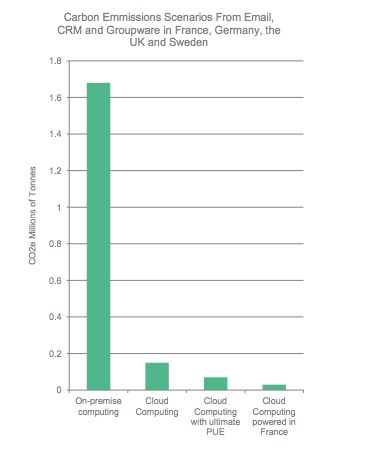The Cloud is Green, says UN broadband commission

The Broadband Commission for Digital Development, an initiative set up by the International Telecommunication Union (ITU), and the UN's Educational, Scientific, and Cultural Organization (UNESCO) released a report on Monday, concluding that Information and Communications Technologies --specifically mobile broadband and cloud computing architectures-- actually help reduce greenhouse gases.
At first blush, it seems obvious: The better connected we are, the less we have to travel to meetings or to send documents, subsequently, less fuel is burned. Likewise, the less physical data and communications equipment we use in the workplace, the less energy we will need.
But the report (.pdf here) actually gets a grip on some concrete figures that point to the ways a strong broadband infrastructure reduces a nation's overall carbon footprint, and turns that data into policy recommendations for world leaders.
The Broadband Commission actually has a few big goals that it's trying to achieve by 2015, which are the reasons for the study. First, it wants to encourage every country have a national broadband plan or strategy to include broadband in their Universal Access/Service definitions. Secondly, it wants developing countries to have affordable entry-level broadband services that amount to less than 5 percent of the average monthly income. Third, it wants 40 percent of households in developing nations to have internet access by 2015. Finally, it wants 60 percent worldwide penetration of Internet use in the developed world, 50 percent in the developing world, and 15 percent in the least developed countries (a list which includes the likes of: Afghanistan, Bangladesh, Myanmar, Yemen, and many central and Sub-Saharan African nations.)
Obviously, the Commission's agenda is all about equalizing and improving global connectivity. Today's report, however, comes ahead of the 2012 United Nations Conference on Sustainable Development (Rio+20) which will focus on developing a global low-carbon economy, so it attempts to illustrate that broadband and cloud initiatives can actually help advance a "greener" world on their own and they should be duly considered in environmental policy.

"The understanding of the benefits that broadband can bring is at a global tipping point. Its role in GDP growth, in enabling the Millennium Development Goals, and offsetting the effects of climate change is just now starting to be understood, because finally the deployment is there and the benefits can be realized. In today's economic climate, societies need to develop, and with a solutions-driven approach to climate change, we can accelerate a new type of green growth while supporting global sustainable development goals," said Hans Vestberg, President and CEO of Ericsson and Chairman of the Broadband Commission Working Group on Climate Change.
The Commission's ten suggestions to policymakers:
- Lead with vision: adopt a long-term National Broadband Plan/Strategy based on universal affordability and accessibility, open markets and innovation, and consciously connect this to your climate goals.
- Bring convergence: Bring convergence to ICT policy formulation so that it aligns with other policy areas such as energy, health, education and climate in order to maximize impact.
- Ensure regulatory certainty: Ensure clear regulatory rules and regulations on climate and broadband to create a framework of investment certainty.
- Be an example: drive cross-ministry collaboration and integrated decision-making to align climate and digital goals, and use government procurement to send the right market signals.
- Foster flexibility: identify and remove the regulatory and policy barriers currently hindering research and investment in 21st century ICT-based broadband-enabled infrastructure and low carbon solutions.
- Provide incentives: encourage uptake of low-carbon solutions and support market change by rewarding or incentivizing desired consumer behaviours. Spur innovation among individuals, companies and sectors.
- Build the market: fund and facilitate scalable pilots to demonstrate feasibility and effectiveness of broadband as an enabler of low-carbon solutions and build a strong business case to attract private investment.
- Form partnerships: cultivate connectivity and 'co-creativity' across public, private and non-governmental sectors and industries to help develop a collaborative mindset, shared goals and a common language, and to help break down silos.
- Measure and standardize: develop harmonized metrics and measurements and common standards for calculating both the environmental impacts of ICTs and the positive contribution technology can make to other sectors - from individual products to systems, and from individual households to the city and/or national levels.
- Share knowledge and raise awareness: actively disseminate project findings, share best practice and learn from mistakes to identify success factors and facilitate leapfrogging, especially among less developed markets. Communicate the opportunities and synergies that can be achieved through an integrated, trans-sector approach to digital development infrastructure and low carbon solutions.
credit: Jannoon028/Shutterstock
